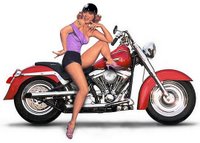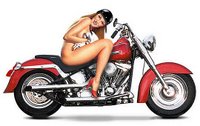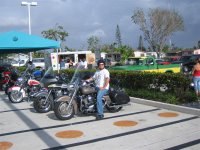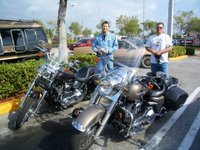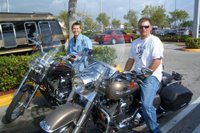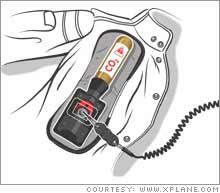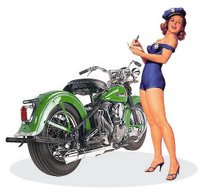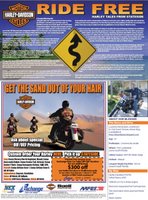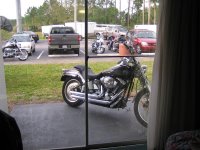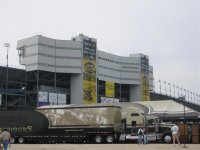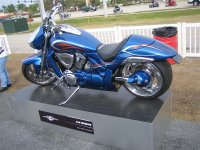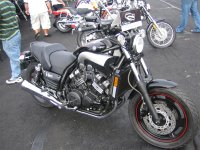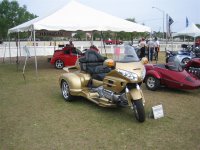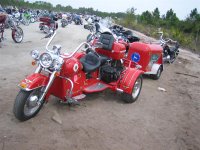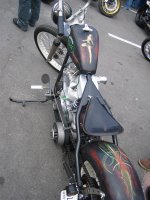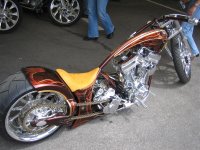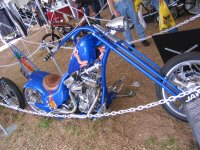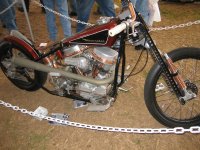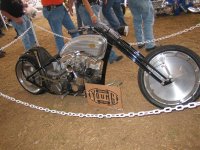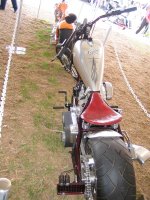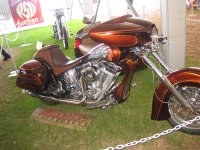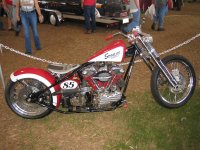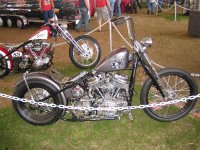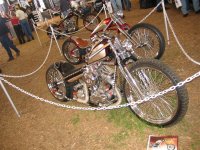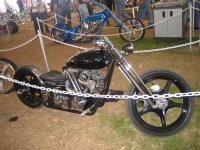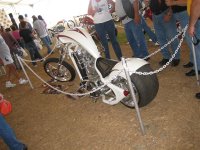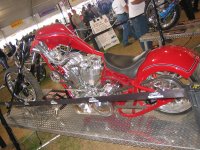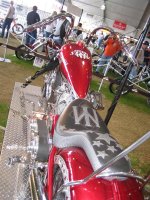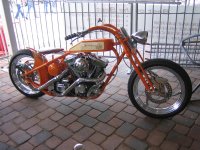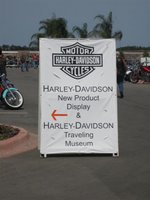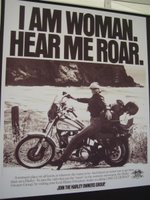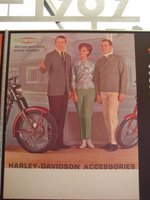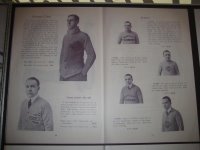
Even if you're not a
Trekkie, or the far more dignified
Trekker, I'd ask you to indulge me, if not for a few paragraphs of this blog just to see how much the 1960's science fiction television landmark has so many similarities to motorcycles and the riders who love them.
Still here? Good.
How this came about.For about a year I've been a member of
Netflix and although
Blockbuster is the first stop for the latest movie releases, it doesn't have the instore selection of television and documentaries the revolutionary online service has.
My journey through
Star Trek: The Next Generation was made officially complete by the delivery of
Star Trek :TOS (The Original Series) last week.
Before we go any further, two things;
- Are you still with me?
- I swear, I don't own any Spock ears or models from any of the TV shows. At least not anymore.
The first thing I noticed about the Star Trek :TOS DVD
(it's amazing how easily you fall into the lingo...scary...right?) is that Paramount only managed to put two episodes on the disc. My
$40 Seinfeld Disc has five episodes per disc and it was filmed in Stereo surround sound, requiring far more precious DVD space than a show from 1966 which just missed out from being filmed in black and white. Obviously Paramount is taking advantage of the poor Trekkers here by spreading the episodes over more discs trying to justify the $100 price tag for an entire series.
Not that I ever looked into buying it.
That's assuming the Trekkers are poor of course. Having never ever dated, they probably have more money than you and I. After all, how much can you spend on Star trek memorabilia?
Back to the point
So I started re-watching the show I grew up with, and saw far more imperfections than I ever remembered. The technology is simply silly compared to today's standards and the sets were, well, just shaky. It was obvious that pieces of plywood were thrown up, blinking lights added and a coat of paint slapped on. Big buttons pressed over and over for different functions and mock screens with pictures glued on.
But I still loved it.
The characters are cliche'd, but only because they've been overdone since the show first appeared in 1966. They were unique and deep compared to the diet of American television at the time it first appeared. Entire books have been written about the Kirk, Spock and McCoy personality triangle.
The lines seemed silly and melodramatic in relation to the current level of sophistication, but when it was running for the first time, cerebral college students were the bulk of its viewing audience. It was their petition writing campaign, the first of its kind, that kept the show on for another series in the shadow of cancellation.
Time for the word motorcycle to appear in a motorcycle blogHow does this relate to motorcycles?
I've written a few times how riding a motorcycle can change your perspective, making the most established facet of life take on a new meaning. Watching this forty year old television show brought this home. Having seen the Star Trek series more times than I'd care to count and quite frankly, more than I'd ever admit, but tonight it was through different eyes.
The science fiction classic is like the old motorcycles of yore. The bikes parents, grandparents and crazy old uncles talk about, lacking the basic technology and systems the modern rider would consider the most basic of necessities.
The episode in the DVD player was the third of the first series,
The Corbomite Maneuver. Costumes were still a little rough, the standards hadn't been set yet and it was obvious that the producers and writers knew what they were trying to achieve, but it was just a path of trial and error to get there.
This sums up the motorcycle in it's various incarnations to a 'T'. Trying to find that perfect engine: is it the V-Twin or the Boxer. How to get the maximum power without all the vibration. Stumbling across and implementing counterbalancing. Is bigger better? Or can more power be had from cylinders already designed. Fuel injection, electric starter, bigger bores, all of the innovations you and I know and see walking around the dealership showroom floor was lived through by the people who rode before us.
Just as the seasoned riders we meet at bike nights, rallies and motorcycle events may seem different, and seemingly living a hackneyed stereotype, believe it or not they came to mind when I saw
William Shatner.
Once again I'd ask for your indulgence.
At the time the show came out,
William Shatner was the man. Sure all the actors who starred in the show knew they were in something that was revolutionizing television, science fiction or even story-telling, depending on how dramatic you'd like to go.
Leonard Nimoy,
DeForest Kelley,
James Doohan,
George Takei,
Nichelle Nichols, and (later)
Walter Koenig all knew the show was something special and are(were) incredible actors. But
Kirk was the man who had the lines, made being in charge cool and got all the girls. Not only that, while all the other actors seemed to distance themselves from the show, he was always proud of it. Okay sometimes it may've been in a mocking way, but don't we consider a sense of humor as endearing?
This could be taken as a direct comparison to the biker of the sixties and seventies. Back then, the wave when two riders met on the road really meant something. They believed in the passion you and I know today and are allowed to enjoy with admiration from our non-riding peers rather than scorn. Like Kirk, the riders of old lived the life many men pined for but didn't have the courage or circumstances to follow. I'm sure as with the good captain, the rebellious image bikers carried in the leathers and long hair brought them their fair share of attention from the fairer sex too.
The comparison between the older riders and seasoned actor can be drawn to present day. William Shatner is still the same person and actor, just in a different time. His fame is, at least in part, from a nod to the semi-campy acting of the 1960's television show. This can make him seem different or difficult for the younger viewers to relate too. Regardless, he does what he knows, enjoys and in the case of acting, pays the bills
See the similarities here?
The older biker can seem from a different time, with no reservations or certain attitudes that may seem foreign the younger rider who never lived that life. Not to be mean and trying to be a respectful as possible, what was his life and was as unique as could be, can sometimes appear to be a tried stereotype.
Fact is, in reality, the stereotype sped past the rider's real life.
The final 'apples to apples' can come not from what happened in the past, but what was hoped for the future.
The legend of Star Trek is entrenched in Gene Roddenberry's vision, the creator of the series. He pioneered a show that had a whole list of firsts: A black woman
(African- American if you so prefer) in a position of power on national TV, all types of nationalities and accents working together, a future of a united Earth
(and star system) who had put war, greed and sickness behind them, living for a greater good
(to go where no man has gone before) and the very first interracial kiss. Actually, it was a decade after Star trek was cancelled before the British Broadcasting Company would show the kiss on television in England.
How does this relate to our humble riding predecessors? Simply put, they stood by the freedom inherent to riding. Working against societies rush to lump all bikers into one convenient stereotype, the riders of yesterday not only went to fight a controversial war for America's freedoms, they also fought the assumptions of a country where motorcycles were not considered a thing 'normally done'.
From science fiction to sincere respectLike you are now, I wondered as the credits of my trip down memory lane rolled by where all these similarities and parallel histories left me.
Just as those college students who crowded around the television to watch this amazingly forward looking first run show, giving dignity to science fiction it had long deserved, you and I can ride thanks to the perseverance and indignant stares our fore-riders before us had to endure and bear.
And as I put the DVD in the envelope to be returned and consequently exchanged for the next disc in the series to be delivered to my door, there was a definite thrill of excitement. Looking forward the Enterprises next adventures to bring out that feeling of wonder, the same feelings countless viewers have felt before me when they truly went 'where no one had gone before'. Although I know they didn't watch the show loyally, talk about it at every moment, lived it passionately and wrote letters to keep it around for one more season just so I could watch it years later in syndication, there's still the gratification that they did do all those things.
Do I really have to spell out the last comparison?



